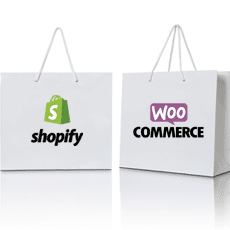Having a website is necessary for small businesses. Australians spend an average 10 hours a day on smart devices accessing social media, searching for information and shopping. Having a strong online presence helps you capture your share of the market.
When you add an eCommerce component to your business you can interact and transact with customers virtually, and dramatically increase your ability to reach people and convert them into customers.
Shopify VS. WooCommerce

If you don’t have much experience with eCommerce knowing which solution is the best for your needs can be difficult. In this post, we look at two popular options, Shopify and WordPress WooCommerce, and compare some of their features.
Both are excellent ways of setting up your eCommerce shop so let’s look closer at both to help you determine if they suit your needs.
What does Shopify do?

Shopify is a versatile eCommerce solution that enables you to sell online as well as in person. To begin selling your services or products, you sign up for an account at Shopify.com.au and setup your store. It is easy for anyone to do but it does come at a price.
Shopify fees
There are three levels of fees: basic shopify ($29 USD per month), shopify ($79 USD per month) and advanced ($299 USD per month).
We don’t recommend the basic version if you are an existing or growing business because of its lack of basic functionality. The advanced plan gives you specialised reports, calculations for third party shipping and lower card rates.
There are no limits to sales on either plan, however, neither includes email hosting. Prices were correct at time of publication. See Shopify site for updated details.
Shopify pros
- Easy to setup the web store in a few steps;
- No separate website needed – hosting included;
- Free SSL certificate for customer transaction security;
- Support available 24/7;
- Good for search engine optimisation;
- Point of Sale (POS) for retail stores options available;
- Easy to update.
Shopify cons
- Limited number of website themes, with most costing around $100 or more;
- Fewer plugins (apps/ tools) available compared to WordPress;
- Difficult to customise website, pages or theme;
- Plugins often charge per month or based on usage;
- Harder to transfer if you move away from Shopify;
- Pay additional fees for using third party payment gateways;
- Limited product attributes.
What does WooCommerce do?

WooCommerce is a flexible WordPress plugin that allows you to add an eCommerce option to your existing or new website. Depending on how comfortable you are with configuring plugins, you may need the help of a professional to set this up successfully.
WooCommerce fees
For the WooCommerce plugin, there is no cost, it is free to download and use. However, there are other costs to consider like:
- Hosting your WordPress website;
- Any paid plugins that are used for additional features – often a 12-month license;
- Setup fees for a professional to customise it to your needs.
There are no sales limits with WooCommerce and you will likely have email hosting as a part of your existing web hosting.
WooCommerce pros
- Greater ownership of your store, look and feel;
- SSL may be included with your hosting package;
- Great for search engine optimisation;
- Easy to update ongoing;
- Thousands of plugins with added features;
- Can use your existing website theme.
WooCommerce cons
- No tailored point of sale option;
- Initial setup more difficult;
- Customer support through web host or web developer;
- Can conflict with other WordPress plugins.
Shopify VS. WooCommerce conclusion
One of the major differences between the two is that Shopify is a standalone option being hosted as an online tool. WooCommerce is a plugin that needs to be installed by you or your provider onto a WordPress website.
They are both good solutions and which one you will use depends on what you need from your eCommerce and how you prefer to interact with it.
Use Shopify for your business if:
- You want an easy setup process;
- You are not interested in the technical details and just want it to be optimised and working on all devices;
- You don’t have a website and want to start selling quickly;
- You want to have access to 24/7 support at no additional cost.
Use WordPress WooCommerce if:
- You want to control your store and be able to fully customise all features;
- You want to access the thousands of WordPress plugins/ tools;
- You feel comfortable or are keen on getting help to setup your store;
- You already have a WordPress website.
Get started
If you are not sure about the best eCommerce solution for you or want to make the next move, contact us at LYF Solutions and we can help you get started. We understand how important an online store is to a small business and can help explore a good option for you.














